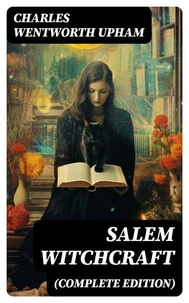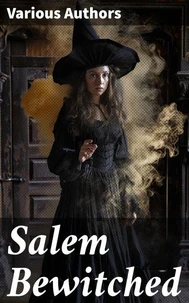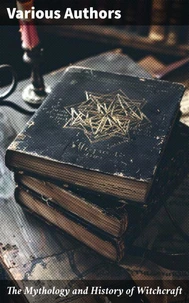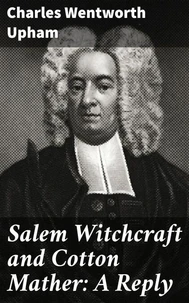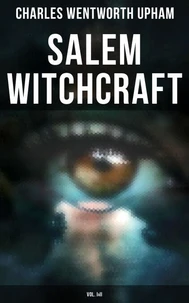The History of Witchcraft in America
Par : , , , ,Formats :
Disponible dans votre compte client Decitre ou Furet du Nord dès validation de votre commande. Le format ePub est :
- Compatible avec une lecture sur My Vivlio (smartphone, tablette, ordinateur)
- Compatible avec une lecture sur liseuses Vivlio
- Pour les liseuses autres que Vivlio, vous devez utiliser le logiciel Adobe Digital Edition. Non compatible avec la lecture sur les liseuses Kindle, Remarkable et Sony
 , qui est-ce ?
, qui est-ce ?Notre partenaire de plateforme de lecture numérique où vous retrouverez l'ensemble de vos ebooks gratuitement
Pour en savoir plus sur nos ebooks, consultez notre aide en ligne ici
- Nombre de pages2032
- FormatePub
- ISBN859-65--4771642-6
- EAN8596547716426
- Date de parution09/11/2023
- Protection num.Digital Watermarking
- Taille3 Mo
- Infos supplémentairesepub
- ÉditeurDIGICAT
Résumé
The anthology 'The History of Witchcraft in America' presents an enthralling exploration of the varied and multifaceted narratives surrounding witchcraft in the American context. Spanning from deeply entrenched superstitions to the sociopolitical dimensions of witch trials, the collection navigates the complex themes of fear, scapegoating, and societal hysteria. Through a blend of historical accounts, philosophical treatises, and cultural analyses, the book offers a diverse stylistic panorama that encapsulates the eeriness and intrigue of its subject matter.
Among its standout pieces are those that weave together oppressive puritanical ethos with intricate archival research, unraveling the enduring legacy of witchcraft in American conscience without isolating any single voice. The contributing authors are stalwarts in their respective fields, collectively bringing forth a trove of historical and cultural insights that expand the anthology's depth. Figures like Increase and Cotton Mather are crucial, with their perspectives entrenched in the religious fervor of their time, providing invaluable documentation and analysis of the supernatural beliefs that gripped early America.
The anthology as a whole is emblematic of the broader 19th-century fascination with esotericism and spiritualism, inviting readers to reconsider the dark recesses of past societal psyche through a multitude of scholarly lenses. This carefully curated collection recommends itself to anyone keen on traversing the shadowy yet enlightening corridors of America's witchcraft history. Its ambition to present a kaleidoscope of perspectives makes it not only educational but also a vital discourse for understanding historical complexities laid bare through meticulous research.
By reading it, one embarks on a journey that is as much about the societies that feared witches as it is about the witches themselves-an insightful tapestry woven from the fibers of America's haunted heritage. The anthology serves as a scholarly resource that urges readers to engage in a stimulating dialogue with its authors through the pages of history.
Among its standout pieces are those that weave together oppressive puritanical ethos with intricate archival research, unraveling the enduring legacy of witchcraft in American conscience without isolating any single voice. The contributing authors are stalwarts in their respective fields, collectively bringing forth a trove of historical and cultural insights that expand the anthology's depth. Figures like Increase and Cotton Mather are crucial, with their perspectives entrenched in the religious fervor of their time, providing invaluable documentation and analysis of the supernatural beliefs that gripped early America.
The anthology as a whole is emblematic of the broader 19th-century fascination with esotericism and spiritualism, inviting readers to reconsider the dark recesses of past societal psyche through a multitude of scholarly lenses. This carefully curated collection recommends itself to anyone keen on traversing the shadowy yet enlightening corridors of America's witchcraft history. Its ambition to present a kaleidoscope of perspectives makes it not only educational but also a vital discourse for understanding historical complexities laid bare through meticulous research.
By reading it, one embarks on a journey that is as much about the societies that feared witches as it is about the witches themselves-an insightful tapestry woven from the fibers of America's haunted heritage. The anthology serves as a scholarly resource that urges readers to engage in a stimulating dialogue with its authors through the pages of history.
The anthology 'The History of Witchcraft in America' presents an enthralling exploration of the varied and multifaceted narratives surrounding witchcraft in the American context. Spanning from deeply entrenched superstitions to the sociopolitical dimensions of witch trials, the collection navigates the complex themes of fear, scapegoating, and societal hysteria. Through a blend of historical accounts, philosophical treatises, and cultural analyses, the book offers a diverse stylistic panorama that encapsulates the eeriness and intrigue of its subject matter.
Among its standout pieces are those that weave together oppressive puritanical ethos with intricate archival research, unraveling the enduring legacy of witchcraft in American conscience without isolating any single voice. The contributing authors are stalwarts in their respective fields, collectively bringing forth a trove of historical and cultural insights that expand the anthology's depth. Figures like Increase and Cotton Mather are crucial, with their perspectives entrenched in the religious fervor of their time, providing invaluable documentation and analysis of the supernatural beliefs that gripped early America.
The anthology as a whole is emblematic of the broader 19th-century fascination with esotericism and spiritualism, inviting readers to reconsider the dark recesses of past societal psyche through a multitude of scholarly lenses. This carefully curated collection recommends itself to anyone keen on traversing the shadowy yet enlightening corridors of America's witchcraft history. Its ambition to present a kaleidoscope of perspectives makes it not only educational but also a vital discourse for understanding historical complexities laid bare through meticulous research.
By reading it, one embarks on a journey that is as much about the societies that feared witches as it is about the witches themselves-an insightful tapestry woven from the fibers of America's haunted heritage. The anthology serves as a scholarly resource that urges readers to engage in a stimulating dialogue with its authors through the pages of history.
Among its standout pieces are those that weave together oppressive puritanical ethos with intricate archival research, unraveling the enduring legacy of witchcraft in American conscience without isolating any single voice. The contributing authors are stalwarts in their respective fields, collectively bringing forth a trove of historical and cultural insights that expand the anthology's depth. Figures like Increase and Cotton Mather are crucial, with their perspectives entrenched in the religious fervor of their time, providing invaluable documentation and analysis of the supernatural beliefs that gripped early America.
The anthology as a whole is emblematic of the broader 19th-century fascination with esotericism and spiritualism, inviting readers to reconsider the dark recesses of past societal psyche through a multitude of scholarly lenses. This carefully curated collection recommends itself to anyone keen on traversing the shadowy yet enlightening corridors of America's witchcraft history. Its ambition to present a kaleidoscope of perspectives makes it not only educational but also a vital discourse for understanding historical complexities laid bare through meticulous research.
By reading it, one embarks on a journey that is as much about the societies that feared witches as it is about the witches themselves-an insightful tapestry woven from the fibers of America's haunted heritage. The anthology serves as a scholarly resource that urges readers to engage in a stimulating dialogue with its authors through the pages of history.



